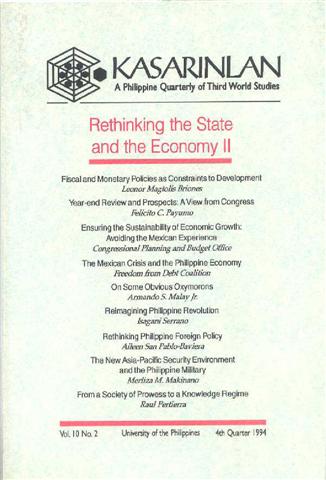Fiscal and Monitary Policies as Constraints to Development
Abstract
This paper examines how the current fiscal and monetary policies of the Philippines are detriments to the attainment of the country's development targets. Fiscal policy is understood to mean the mix of policies on taxation and other revenue, expenditure, and borrowing, which is intended to promote stabilization and development of the economy -- all of which are articulated in the national budget. Meanwhile, monetary policy is generally understood to be that which influences the level of money supply in the economy. The paper finds fault in the following elements of the country's fiscal policy: the honorable debtor policy, wherein economic and social development services are sacrificed for debts; the prioritization of debt servicing in the budget; negative transfers, or the imbalance of resource inflows between the state and its creditors, with the greater amount moving toward the latter; and the country's uncontrolled debt to Japan. The paper also criticizes the country's dependence on revenues from indirect taxation, which runs counter to the progressive taxation system which it ought to espouse. The country's monetary policy is criticized for rigidly imposing monetary constraints, which causes an upward pressure on interest rates. In conclusion, the paper challenges the government, with the assistance of progressive groups, to radically alter its fiscal and monetary policies, reorienting public expenditures toward infrastructure and social services and relaxing its monetary targets.
Published
2008-06-06
How to Cite
BRIONES, Leonor Magtolis.
Fiscal and Monitary Policies as Constraints to Development.
Kasarinlan: Philippine Journal of Third World Studies, [S.l.], v. 10, n. 2, june 2008.
ISSN 2012-080X.
Available at: <https://journals.upd.edu.ph/index.php/kasarinlan/article/view/879>. Date accessed: 26 aug. 2025.
Section
Features
By submitting a manuscript, the authors agree that the exclusive rights to reproduce and distribute the article have been given to the Third World Studies Center.



